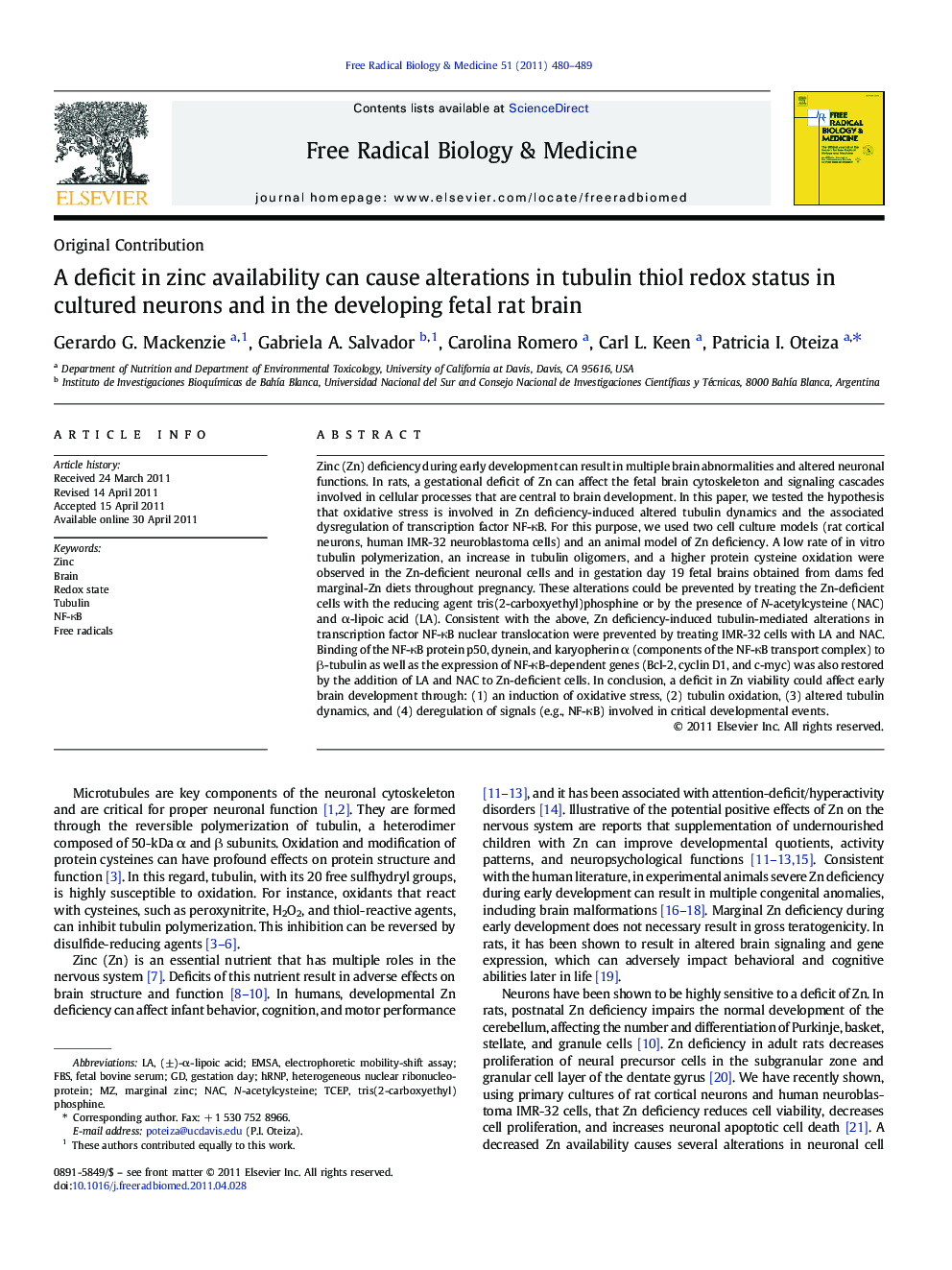| کد مقاله | کد نشریه | سال انتشار | مقاله انگلیسی | نسخه تمام متن |
|---|---|---|---|---|
| 10738081 | 1046682 | 2011 | 10 صفحه PDF | دانلود رایگان |
عنوان انگلیسی مقاله ISI
A deficit in zinc availability can cause alterations in tubulin thiol redox status in cultured neurons and in the developing fetal rat brain
دانلود مقاله + سفارش ترجمه
دانلود مقاله ISI انگلیسی
رایگان برای ایرانیان
کلمات کلیدی
NF-κBFBSNACEMSAN-acetylcysteine - N-استیل سیستئینtris(2-carboxyethyl)phosphine - tris (2-carboxyethyl) فسفینelectrophoretic mobility-shift assay - تحرک انتقال الکتریکی - تحرک تغییرtubulin - توبولینRedox state - دولت RedoxFree radicals - رادیکال آزادgestation day - روز بارداریheterogeneous nuclear ribonucleoprotein - ریبونولوپروتئین ناهمگن هسته ایTCEP - ساکتfetal bovine serum - سرم جنین گاوZinc - فلز رویBrain - مغز
موضوعات مرتبط
علوم زیستی و بیوفناوری
بیوشیمی، ژنتیک و زیست شناسی مولکولی
سالمندی
پیش نمایش صفحه اول مقاله

چکیده انگلیسی
Zinc (Zn) deficiency during early development can result in multiple brain abnormalities and altered neuronal functions. In rats, a gestational deficit of Zn can affect the fetal brain cytoskeleton and signaling cascades involved in cellular processes that are central to brain development. In this paper, we tested the hypothesis that oxidative stress is involved in Zn deficiency-induced altered tubulin dynamics and the associated dysregulation of transcription factor NF-κB. For this purpose, we used two cell culture models (rat cortical neurons, human IMR-32 neuroblastoma cells) and an animal model of Zn deficiency. A low rate of in vitro tubulin polymerization, an increase in tubulin oligomers, and a higher protein cysteine oxidation were observed in the Zn-deficient neuronal cells and in gestation day 19 fetal brains obtained from dams fed marginal-Zn diets throughout pregnancy. These alterations could be prevented by treating the Zn-deficient cells with the reducing agent tris(2-carboxyethyl)phosphine or by the presence of N-acetylcysteine (NAC) and α-lipoic acid (LA). Consistent with the above, Zn deficiency-induced tubulin-mediated alterations in transcription factor NF-κB nuclear translocation were prevented by treating IMR-32 cells with LA and NAC. Binding of the NF-κB protein p50, dynein, and karyopherin α (components of the NF-κB transport complex) to β-tubulin as well as the expression of NF-κB-dependent genes (Bcl-2, cyclin D1, and c-myc) was also restored by the addition of LA and NAC to Zn-deficient cells. In conclusion, a deficit in Zn viability could affect early brain development through: (1) an induction of oxidative stress, (2) tubulin oxidation, (3) altered tubulin dynamics, and (4) deregulation of signals (e.g., NF-κB) involved in critical developmental events.
ناشر
Database: Elsevier - ScienceDirect (ساینس دایرکت)
Journal: Free Radical Biology and Medicine - Volume 51, Issue 2, 15 July 2011, Pages 480-489
Journal: Free Radical Biology and Medicine - Volume 51, Issue 2, 15 July 2011, Pages 480-489
نویسندگان
Gerardo G. Mackenzie, Gabriela A. Salvador, Carolina Romero, Carl L. Keen, Patricia I. Oteiza,